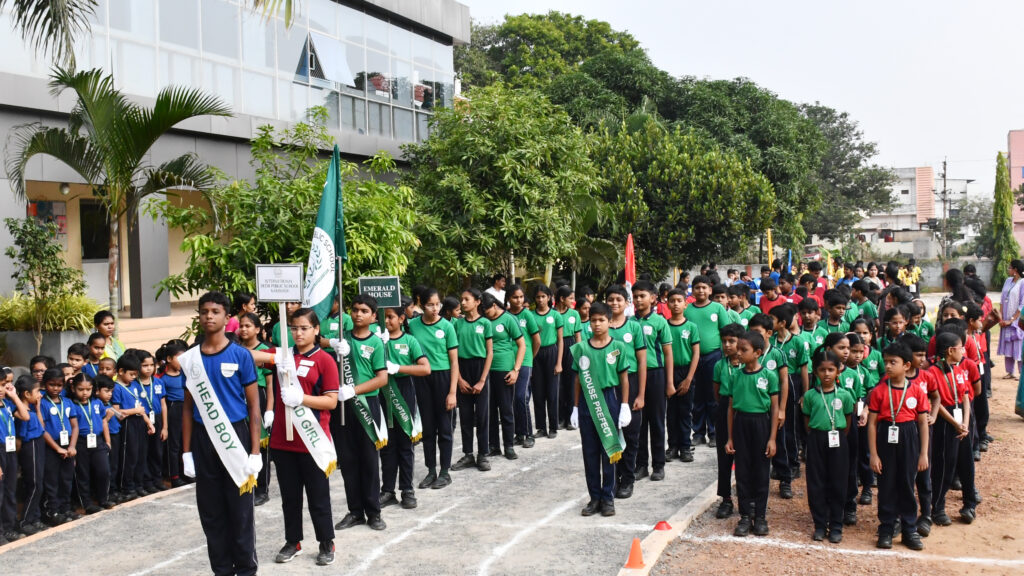What Are the Teacher Training Workshops at Delhi Public School Kakinada?
Delhi Public School Kakinada conducts specialized teacher training workshops to enhance the professional development of educators. These workshops focus on refining teaching methodologies, integrating technology, improving classroom management, and fostering a collaborative learning environment. The programs aim to equip teachers with the skills needed to cater to the diverse needs of students and enhance the overall educational experience.
Why Are These Workshops Important?
Teacher training is crucial in the modern educational landscape to ensure educators remain up-to-date with evolving teaching practices and technologies. In a world where students have access to vast amounts of information, it’s essential that educators are equipped with the tools and strategies to engage and inspire them. These workshops at Delhi Public School Kakinada focus on providing teachers with innovative tools, modern pedagogical approaches, and new ways to approach assessment and classroom management, thus empowering them to deliver high-quality education.
How Are the Workshops Conducted?
The workshops at Delhi Public School Kakinada are conducted through interactive sessions that combine theoretical knowledge with practical applications. They employ a variety of formats, including lectures, group activities, hands-on demonstrations, and discussions. These sessions allow educators to not only gain new insights but also collaborate and share experiences with their peers. The workshops cover key areas such as pedagogical techniques, technology integration, classroom management strategies, and inclusive education practices. Guest speakers and educational consultants are also invited to enhance the learning experience.
Process of the Teacher Training Workshops
The process of Delhi Public School Kakinada’s teacher training workshops is carefully structured to ensure maximum effectiveness and impact. Here is an overview of how the workshops are typically conducted:
- Needs Assessment: Before the workshops are conducted, a needs assessment is carried out to identify the areas where teachers require the most support. This could include surveys, interviews, or observations in the classroom to understand specific challenges educators are facing. This assessment ensures that the content of the workshops is relevant and tailored to the needs of the teachers.
- Setting Learning Objectives: Once the areas of improvement are identified, clear learning objectives are set for the workshop. These objectives guide the entire training process and ensure that both teachers and trainers are aligned in terms of what they aim to achieve. Whether the goal is to improve classroom management or enhance the use of digital tools, these objectives help maintain focus throughout the sessions.
- Interactive Sessions and Activities: The core of the workshops consists of interactive sessions where teachers are introduced to new pedagogical strategies, technologies, and classroom management techniques. These sessions are highly participatory, incorporating group activities, role-playing, case studies, and peer discussions. Teachers are given opportunities to practice the new methods in a safe, supportive environment.
- Hands-on Training with Tools and Technology: A significant aspect of the workshops is the hands-on training with various tools and technologies. Teachers are introduced to digital resources, educational software, and online platforms that can be incorporated into their lessons. These practical sessions allow educators to become familiar with the technology and learn how to use it effectively in their classrooms.
- Model Lessons and Demonstrations: During the workshops, experienced trainers or guest educators often conduct model lessons to demonstrate the application of various teaching techniques. These demonstrations provide teachers with real-world examples of how to implement strategies such as inquiry-based learning, flipped classrooms, or differentiated instruction.
- Feedback and Reflection: After the training sessions, teachers engage in reflective discussions about the content they learned and how they can apply it in their own classrooms. Peer feedback is encouraged, and educators are given an opportunity to share their experiences and challenges. This process helps reinforce the lessons learned and allows for continuous improvement.
- Follow-up and Support: The teacher training workshops at Delhi Public School Kakinada do not end after the initial sessions. Follow-up support is provided to ensure that the techniques learned are being effectively implemented in the classroom. This could include additional workshops, one-on-one coaching sessions, or online resources. Ongoing support ensures that teachers are continuously refining their skills and staying up-to-date with best practices.
Key Features of the Teacher Training Workshops
- Pedagogical Techniques: The workshops introduce teachers to innovative pedagogical methods such as inquiry-based learning, flipped classrooms, and experiential learning. These approaches prioritize student engagement and critical thinking, helping students to become active participants in their learning process.
- Integration of Technology: Teachers are trained in the use of digital tools, apps, and learning management systems (LMS) to enhance the learning experience. The workshops emphasize the importance of digital literacy and equip teachers with the skills to effectively integrate technology in the classroom.
- Classroom Management Strategies: Effective classroom management is a key focus. Teachers learn techniques to manage diverse classrooms, promote positive behavior, and create structured routines that support student learning. Emotional intelligence and conflict resolution skills are also addressed.
- Assessment Techniques: The workshops highlight the importance of formative assessments that go beyond traditional exams. Teachers are introduced to new assessment methods that emphasize creativity, collaboration, and problem-solving. Personalized feedback techniques are also covered, ensuring teachers can guide students effectively.
- Inclusive Education Practices: A significant feature of the workshops is the emphasis on inclusivity. Teachers are trained in differentiated instruction and strategies for catering to the diverse needs of students, including those with special educational needs (SEN).
- Holistic Development: Teachers are encouraged to focus on the overall development of students, including their emotional, social, and physical well-being. The workshops advocate for the incorporation of arts, sports, and extracurricular activities into the curriculum to promote well-rounded development.
- Collaboration and Professional Networking: The workshops foster a collaborative environment where teachers can share ideas and learn from each other. Networking opportunities with professionals in the education field help teachers stay informed about the latest trends and research.
Benefits of the Teacher Training Workshops
- Enhanced Teaching Skills: Teachers are equipped with innovative teaching strategies that improve student engagement, critical thinking, and problem-solving skills.
- Increased Technological Competence: Teachers gain the skills necessary to integrate technology effectively into their lessons, enhancing the learning experience and preparing students for a digital future.
- Improved Classroom Management: Educators learn to create a positive classroom environment that supports student learning, reduces disruptions, and fosters emotional and social development.
- Personalized Assessment and Feedback: Teachers develop the ability to provide more personalized and constructive feedback, helping students identify areas for improvement and celebrate their successes.
- Inclusive Learning Environment: Teachers are trained to recognize and cater to the diverse needs of students, ensuring that every child, regardless of their background or learning abilities, has an equal opportunity to succeed.
- Holistic Student Development: By focusing on the overall development of students, teachers help nurture well-rounded individuals who are prepared to excel in both academic and life challenges.
- Professional Growth and Networking: Teachers benefit from a collaborative learning environment and the opportunity to network with professionals in the field, which supports continuous growth and development.
Conclusion
Delhi Public School Kakinada’s teacher training workshops are a vital component of the institution’s commitment to educational excellence. By focusing on innovative pedagogical approaches, technology integration, inclusive education, and holistic student development, these workshops empower teachers to enhance the learning experience. The professional growth of educators directly impacts the quality of education students receive, preparing them for future challenges in a rapidly changing world. These workshops not only improve teaching practices but also foster a supportive and collaborative environment where educators can grow, share knowledge, and stay ahead of the curve.
Frequently Asked Questions
The workshops aim to empower educators with innovative teaching strategies, leadership skills, and techniques to maximize student engagement. For instance, sessions have focused on “Maximizing Student Engagement through Active Learning” and “Teaching for Transfer” .
Instagram
Teachers gain insights into effective classroom practices, enhance their leadership capabilities, and learn methods to foster a more interactive and engaging learning environment for students .
While specific schedules may vary, DPS Kakinada organizes these workshops periodically to ensure that educators stay updated with the latest educational trends and methodologies.
Yes, the training sessions are designed to align with contemporary educational standards, ensuring that the teaching practices meet the required competencies and learning outcomes.
Interested individuals can follow DPS Kakinada’s official social media channels, such as their Instagram page, for updates on upcoming workshops and events.








